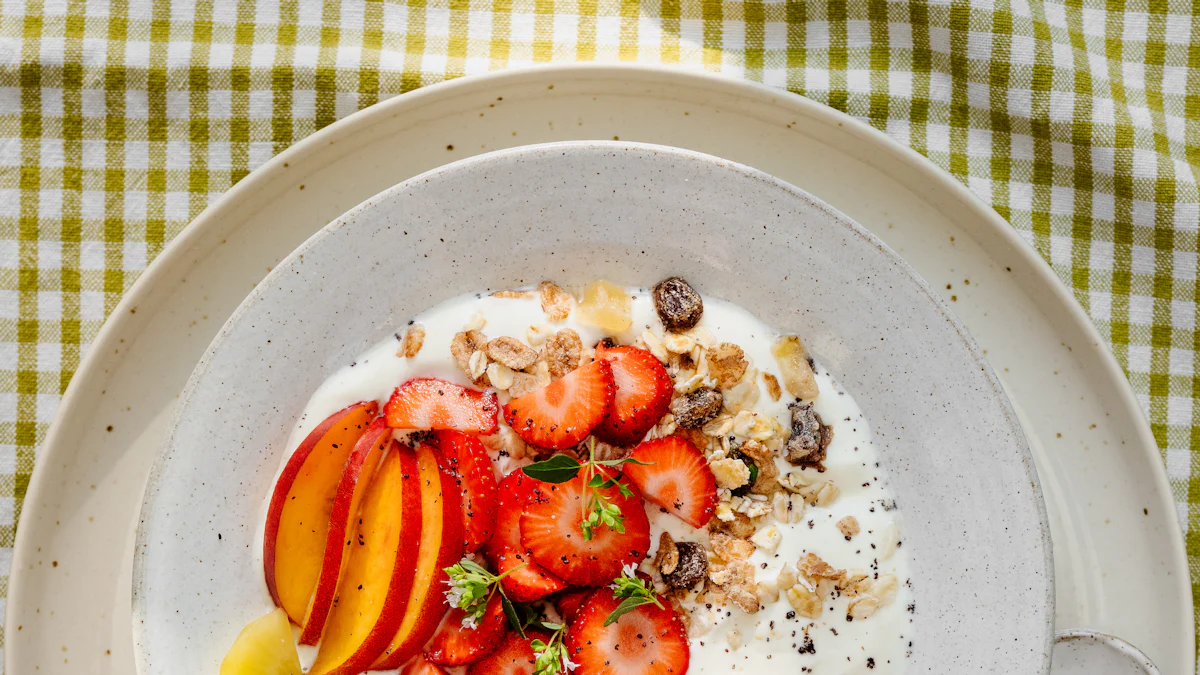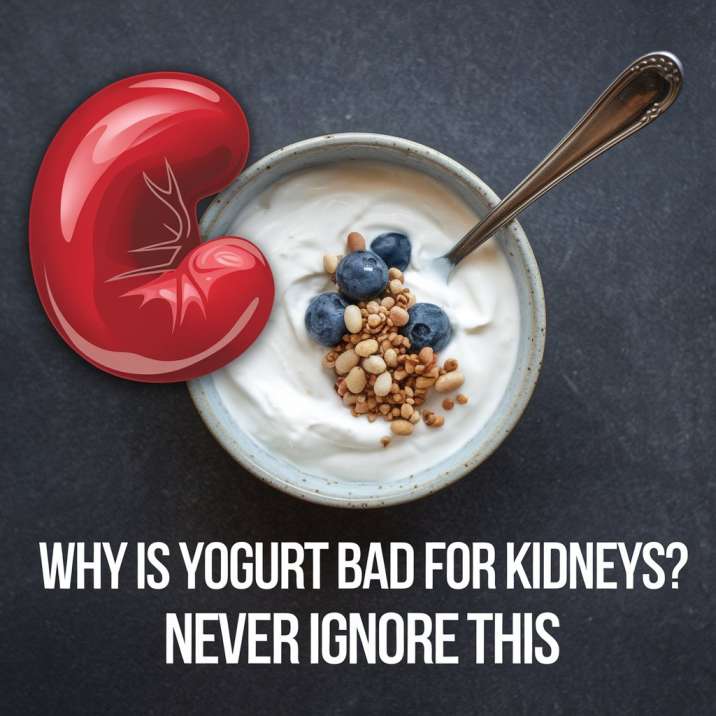Summary: The article discusses the potential risks and benefits of yogurt for individuals with kidney issues. While yogurt is rich in protein, phosphorus, and potassium—nutrients that can strain compromised kidneys—it also offers advantages like calcium and probiotics that may support overall health. Research indicates that moderate yogurt consumptio
Summary: The article discusses the potential risks and benefits of yogurt for individuals with kidney issues. While yogurt is rich in protein, phosphorus, and potassium—nutrients that can strain compromised kidneys—it also offers advantages like calcium and probiotics that may support overall health. Research indicates that moderate yogurt consumption may be linked to lower risks of chronic kidney disease (CKD), particularly among women and older adults.

Understanding why yogurt is bad for kidneys is crucial. The kidneys play a vital role in filtering waste and maintaining nutrient balance in our bodies. However, certain foods, such as yogurt, can pose risks. Yogurt is high in protein, phosphorus, and potassium, which can put additional strain on the kidneys, particularly if they are already compromised. By being aware of why yogurt is bad for kidneys, we can make more informed dietary choices to support kidney health and enhance our overall well-being.
Can kidney patients eat yogurt?
I often think about if people with kidney problems can eat yogurt safely. The answer is not simple. Yogurt has a lot of protein, phosphorus, and potassium. These can be bad for kidneys that are not healthy. But yogurt also has good things like calcium and vitamin D, which help bones stay strong.
Scientific Research Findings:
- A study called ‘Association between probiotic and yogurt consumption and kidney disease’ showed that eating yogurt was linked to less chronic kidney disease (CKD). People who ate yogurt had a 12% lower chance of moderate CKD and an 11% lower chance of very high CKD.
Even with these findings, eating in moderation is important. Dietitians say to limit yogurt for those on low-potassium, low-phosphorus diets. Greek yogurt has lots of protein and may not be good for everyone with kidney issues.
“Calcium in milk and yogurt can decrease the risk of forming kidney stones.”
This quote shows how yogurt might help kidneys. But it’s important to weigh the good against the bad. Talking to doctors can help make food choices right for each person.
For those who love yogurt but need to be careful, try these ideas:
- Choose fat-free or low-fat yogurt to have less phosphorus and potassium.
- Try plant-based yogurts, which usually have less potassium than dairy ones.
Is yogurt good for kidney disease?
I often think about if yogurt helps people with kidney problems. It’s not a simple answer. Yogurt has important things like calcium and vitamin D, which are good for bones. But it also has a lot of phosphorus and potassium, which can be bad for kidneys.
Scientific Research Findings:
- A study called ‘Association between probiotic and yogurt consumption and kidney disease: insights from NHANES’ says yogurt might help stop chronic kidney disease (CKD) from getting worse. This is more true for women and older people, with a 32% lower risk in those over 55.
Even with these good points, I must think about the bad ones too. Greek yogurt has lots of phosphorus and potassium. These can hurt people with kidney issues because they might need to eat less of them.
“Greek yogurt is high in phosphorus and potassium, which some people with kidney disease need to limit in their diet.” – Journal of Renal Nutrition
To make smart food choices, I suggest talking to doctors. They can give advice based on health needs. For those who love yogurt but have to be careful, try these ideas:
- Pick low-phosphorus and low-potassium yogurts.
- Look at plant-based yogurts, which usually have less of these minerals than dairy ones.
By knowing both the good and bad sides, I can decide better about having yogurt in a kidney-friendly diet.
Greek Yogurt for Chronic Kidney Disease
I think about if Greek yogurt is okay for CKD. It has a lot of protein. Protein helps muscles grow but too much can hurt kidneys.
Scientific Research Findings:
- Greek Yogurt and CKD: A study says bad gut bacteria might cause CKD. Probiotics, prebiotics, or yogurt could slow it down.
Greek yogurt has probiotics, which are good germs. These help the stomach and kidneys. The NHANES findings say yogurt might stop CKD and lower its risk, especially in women and older people.
“Probiotic, prebiotic, or yogurt may help stop CKD.” – NHANES findings
When picking Greek yogurt, I choose ones with less phosphorus and potassium. These minerals are high in Greek yogurt and not good for everyone with CKD.
Here are tips to eat Greek yogurt safely:
- Pick plain Greek yogurt: Flavored ones have extra sugar.
- Read labels: Find brands with less phosphorus and potassium.
- Watch portion sizes: Eating small amounts helps control nutrients.
By knowing the good and bad parts, I can decide on having Greek yogurt in a kidney-friendly diet. Talking to doctors makes sure my food choices match my health needs.
Avoid unpasteurized yogurt

I often worry about yogurt safety, especially for kidneys. Unpasteurized yogurt has bad bacteria. These can cause infections, which are risky for weak kidneys.
Why Choose Pasteurized Yogurt?
- Safety First: Pasteurization kills bad germs. This makes yogurt safer.
- Healthier Choice: For kidney issues, avoiding infections is key. Pasteurized yogurt helps lower this risk.
“Probiotic, prebiotic, or yogurt supplements may help stop CKD.” – NHANES Study
This shows yogurt’s benefits when it’s safe. Unpasteurized lacks this safety.
Tips for Choosing Safe Yogurt:
- Check Labels: Look for “pasteurized” on packages.
- Consult Experts: Ask doctors about safe yogurts.
- Stay Informed: Follow food safety rules to stay healthy.
By picking pasteurized yogurt, I enjoy benefits without hurting my kidneys.
What kind of yogurt is good for kidney stones
I think about the best yogurt for people with kidney stones. Kidney stones happen when minerals gather in kidneys. Picking the right yogurt can help manage this.
Understanding Kidney Stones:
- Stones often have calcium oxalate.
- Right calcium intake lowers stone risk.
Yogurt gives calcium, which helps bones. But not all yogurts are good for kidney stones.
Best Yogurt Choices:
- Low-Oxalate Yogurt:
- Pick yogurts low in oxalates to stop stones.
- Calcium-Rich Options:
- Choose yogurts high in calcium to bind oxalates and reduce risk.
- Plain Yogurt:
- Avoid extra sugars and flavors; plain is healthier.
- Plant-Based Yogurts:
- Try almond or coconut yogurts; they have less oxalate.
“Calcium in milk and yogurt can decrease the risk of forming kidney stones.”
This shows how calcium helps prevent stones. By picking the right yogurt, I support kidney health well.
Tips for Choosing Yogurt:
- Read Labels: Look for calcium and avoid high-oxalate items.
- Consult Healthcare Providers: Get advice based on your health needs.
- Moderation: Eat yogurt moderately to balance nutrients.
By knowing these points, I choose yogurt that fits my kidney health goals.
5 Kidney-Friendly Yogurt Recipes
I like finding ways to eat yogurt and keep my kidneys healthy. Here are five tasty yogurt recipes I often make. These give different choices for a kidney-friendly diet.
1. Berry Delight Yogurt Parfait
This parfait is a great start to my day. It mixes sweet berries with creamy yogurt.
- Ingredients:
- 1 cup low-fat plain yogurt
- 1/2 cup sliced strawberries
- 1/2 cup blueberries
- 1 tablespoon honey
- 1/4 cup low-phosphorus granola
- Instructions:
- Layer yogurt, strawberries, and blueberries in a glass.
- Add honey on top.
- Sprinkle granola for crunch.
2. Cucumber Mint Yogurt Dip
This dip is perfect as a snack or side dish with veggies.
- Ingredients:
- 1 cup Greek yogurt (low-potassium)
- Grated half cucumber
- Chopped fresh mint, one tablespoon
- One teaspoon lemon juice
- Salt to taste
- Instructions:
- Mix yogurt, cucumber, and mint in a bowl.
- Add lemon juice and salt.
- Chill before serving with veggies.
3. Tropical Yogurt Smoothie
I enjoy this smoothie for a quick breakfast.
- Ingredients:
- Coconut yogurt, one cup
- Half banana
- Pineapple chunks, half cup
- Almond milk, half cup
- Instructions:
- Blend all ingredients until smooth.
- Pour into a glass and drink.
4. Herb-Infused Yogurt Dressing
This dressing adds flavor to salads without too much stress on kidneys.
- Ingredients:
- Plain yogurt, one cup
- Olive oil, one tablespoon
- Dried dill, one teaspoon
- Garlic powder, one teaspoon
- Salt and pepper to taste
- Instructions:
- Whisk all ingredients in a bowl.
- Season with salt and pepper.
- Drizzle over salad.
Peach Yogurt Popsicles
These popsicles are cool treats for hot days.
- Ingredients: Low-fat yogurt, one cup Peach slices (fresh or canned), one cup Honey, one tablespoon
- Instructions: Blend all ingredients until smooth. Pour into molds. Freeze until solid.
These recipes let me enjoy yogurt while caring for my kidneys with balanced flavors and nutrients in my meals.
Why Is yogurt bad for kidneys: Nutritional Parts of Yogurt
Knowing why yogurt might harm kidneys means looking at its nutrients. I often think about how these parts affect kidney health.
Protein Amount
Yogurt has a lot of protein, which helps muscles grow. But too much protein can stress the kidneys, especially if they’re weak.
Effect on Kidneys
Eating lots of protein makes kidneys work harder. They have to filter more waste, which is tough for sick kidneys. A study says protein is important for dialysis patients, but others should eat it carefully.
How Much Protein to Eat
I find it important to follow food rules. People with kidney worries should ask doctors how much protein is right. This way, I stay healthy without hurting my kidneys.
Phosphorus in Yogurt
Phosphorus in yogurt needs attention too. It helps bones but can be bad for kidneys.
Phosphorus and Kidney Problems
When kidneys don’t work well, phosphorus builds up in blood. This causes bone and heart issues. The Journal of Renal Nutrition says Greek yogurt has lots of phosphorus, so it’s a worry for kidney patients.
Controlling Phosphorus Eating
I control phosphorus by picking yogurts with less of it. Reading labels and asking dietitians help me choose foods that fit my health needs.
Potassium Worries
Potassium is needed for heart and muscles but can be risky for kidney problems.
Potassium’s Job in the Body
Potassium keeps fluids balanced and nerves working right. But if kidneys can’t filter it well, high levels cause big health troubles.
Dangers of Too Much Potassium
Too much potassium harms the heart. The NHANES study says yogurt, especially Greek kind, has high potassium levels. So I watch what I eat and talk to doctors.
By knowing these nutrients, I see why yogurt might hurt kidneys. Making smart choices lets me enjoy yogurt while keeping my kidneys safe.
Scientific Proof and Expert Advice
Dairy and Kidneys Studies
Main Findings
I often look into how dairy affects kidneys. Studies say dairy, like yogurt, has lots of phosphorus, potassium, and protein. These can be hard for people with kidney problems.
“Dairy has high phosphorus, potassium, and protein; limit in kidney diets.” – Many Diet and Kidney Experts
Even with these worries, yogurt gives important things like calcium and vitamin D. These are good for bones, especially if you’re on dialysis.
Expert Tips
Experts say to eat yogurt carefully if you have kidney issues. For healthy kidneys, two dairy servings a day can help. But if you have kidney disease, talk to a doctor first.
“If your kidneys work fine, adults need two dairy servings daily.” – Diet and Kidney Experts
Different Opinions
Yogurt’s Possible Good Points
Yogurt might help even with kidney worries. It has probiotics that can make the stomach healthier. Some studies say probiotics might slow down CKD.
“Probiotics or yogurt may help slow CKD.” – NHANES Study
Weighing Risks and Benefits
It’s important to weigh yogurt’s risks and benefits. While it gives good nutrients, its high potassium and phosphorus need careful watching. I find working with a dietitian helps me pick the right amount and kind of yogurt for my needs.
By knowing both sides, I choose wisely about having yogurt while keeping my kidneys healthy.
Special Cases and Things to Think About
Diet After Kidney Transplant
After getting a new kidney, I eat foods that help me heal.
Importance of Calcium
Calcium is very important for strong bones. I make sure to get enough calcium to keep my bones healthy. Yogurt has calcium, but I pick ones with less phosphorus.
Choosing Safe Dairy
I choose dairy that is pasteurized and low in phosphorus. These choices help keep my diet balanced without hurting my kidneys. Talking to my doctor helps me pick the safest foods.
Personal Food Needs
Everyone needs different foods. I change my diet to fit what I need.
Talking to Doctors
I often talk to doctors about what I should eat. They help me make smart food choices for my kidneys. Their advice shows which foods are good for me.
Custom Nutrition Plans
Making a special eating plan is key. I work with diet experts to create a plan just for me. This way, I get the right nutrients and protect my kidneys.
By thinking about these things, I manage what I eat well and keep my kidneys healthy.
Practical Tips for Worried Readers
Watching Dairy Amounts
I think it’s important to watch how much dairy I eat, especially for kidney health. Dairy like yogurt has lots of phosphorus, potassium, and protein. These can be hard for people with kidney problems.
Controlling Portions
To manage my dairy well, I focus on eating smaller amounts. By having less yogurt, I enjoy it without hurting my kidneys. Small servings help me keep a balanced diet. This way, I can have yogurt and control nutrients.
Other Nutrient Sources
I look for other ways to get nutrients to keep my diet healthy. Plant-based yogurts often have less potassium than regular ones. I also eat calcium-rich foods like leafy greens and plant milks. These give me nutrients without stressing my kidneys.
Getting Expert Help
For managing my diet, getting expert advice is key. Doctors and dietitians give helpful tips for my health needs.
Regular Health Check-Ups
Regular doctor visits help me know about my kidney health. These check-ups let me talk about food worries and change habits if needed. Staying informed helps me make good choices for my well-being.
Working with a Dietitian
A dietitian gives me special nutrition plans. They know about kidney health and suggest good food changes. They help balance vitamins and minerals without harming kidneys.
“If your kidneys are fine, adults need two dairy servings daily.” – Doctor or Dietitian
By using these tips and expert advice, I can enjoy yogurt safely while caring for my kidneys.
Clearing Up Yogurt Myths
Myths About Yogurt
I often hear wrong ideas about yogurt and kidneys. It’s important to know the truth.
Explaining Health Facts
Some think yogurt is good for everyone. This isn’t true if you have kidney problems. Yogurt has lots of protein, phosphorus, and potassium. These can be bad for weak kidneys.
“Yogurt’s nutrients can stress sick kidneys.”
Knowing this helps me choose better foods.
Trusting Science
I use science to decide how much yogurt to eat. Studies show yogurt has good things like probiotics but needs careful eating for kidney health.
- Survey Results: A survey showed many people don’t understand yogurt’s nutrition, especially plant-based versus dairy kinds.
By trusting facts, I can enjoy yogurt safely.
Reading Labels
Checking yogurt labels helps me pick what’s best for my health.
Checking Nutrition Info
I always look at the nutrition info on yogurt packs. This helps me watch phosphorus and potassium levels.
- Find low-phosphorus and low-potassium yogurts.
- Compare protein amounts to fit my diet plan.
Watching Out for Hidden Stuff
Some yogurts have hidden things that aren’t good for kidneys. I check for additives that might harm my health.
“Hidden stuff in yogurt can hurt kidney health.”
By reading labels, I make smart choices that keep my kidneys healthy.
Trying Different Yogurt Options
Non-Dairy Choices
I like trying non-dairy yogurts to keep my kidneys safe. Plant-based yogurts are a good choice.
Plant-Based Yogurts
Almond or coconut yogurts taste great and are healthy. They usually have less potassium and phosphorus than milk yogurts. Almond yogurt is full of nutrients and has a nice taste.
Comparing Nutrients
When I compare plant-based with milk yogurts, I see some differences:
- Less Sugar: Plant-based ones have less sugar.
- More Fiber: They help digestion with more fiber.
- Lower Salt: These have less salt, so they’re healthier.
But they might not have as much protein, calcium, or potassium as milk ones. I eat other foods to get these nutrients.
Other Foods Good for Kidneys
Eating different kidney-friendly foods keeps my diet balanced.
Adding Variety
I like adding different foods to my meals. Leafy greens, berries, and whole grains give me important nutrients without hurting my kidneys. This makes meals fun and healthy.
Planning Balanced Meals
Planning meals helps me get the right nutrients. I watch portion sizes and pick foods rich in vitamins and minerals. A dietitian helps me make a plan that keeps my kidneys healthy.
By trying new options and planning meals well, I enjoy tasty food while caring for my kidneys.
Knowing how yogurt affects kidneys is important. Yogurt has good things like protein and calcium. But it also has a lot of phosphorus and potassium, especially in Greek yogurt.
Helpful Tips:
- Pick yogurts with less phosphorus and potassium.
- Try plant-based yogurts.
- Ask a dietitian for advice that fits you.
“Probiotic, prebiotic, or yogurt supplements might lower CKD risk.”
By choosing wisely and getting expert help, I can eat yogurt and keep my kidneys healthy.

